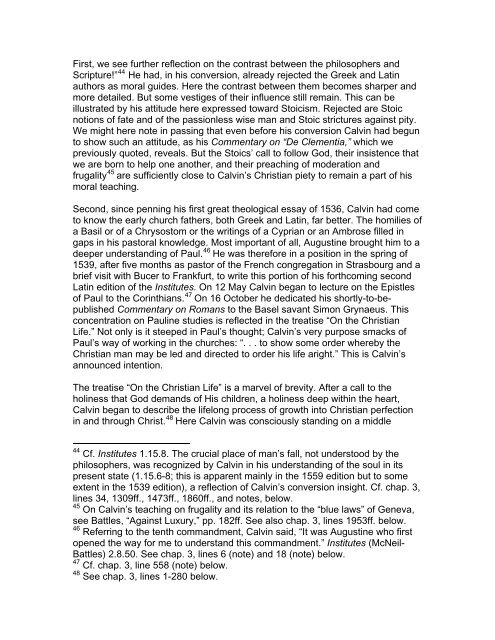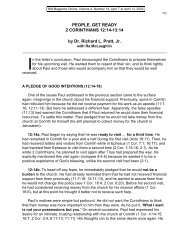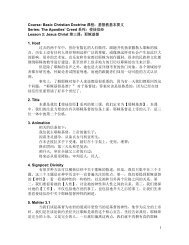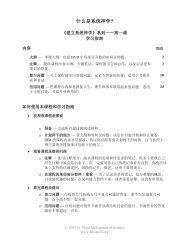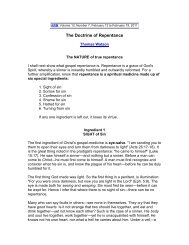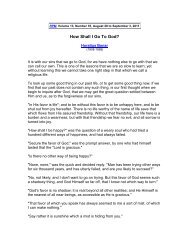The Piety of John Calvin - Third Millennium Ministries
The Piety of John Calvin - Third Millennium Ministries
The Piety of John Calvin - Third Millennium Ministries
You also want an ePaper? Increase the reach of your titles
YUMPU automatically turns print PDFs into web optimized ePapers that Google loves.
First, we see further reflection on the contrast between the philosophers and<br />
Scripture!” 44 He had, in his conversion, already rejected the Greek and Latin<br />
authors as moral guides. Here the contrast between them becomes sharper and<br />
more detailed. But some vestiges <strong>of</strong> their influence still remain. This can be<br />
illustrated by his attitude here expressed toward Stoicism. Rejected are Stoic<br />
notions <strong>of</strong> fate and <strong>of</strong> the passionless wise man and Stoic strictures against pity.<br />
We might here note in passing that even before his conversion <strong>Calvin</strong> had begun<br />
to show such an attitude, as his Commentary on “De Clementia,” which we<br />
previously quoted, reveals. But the Stoics’ call to follow God, their insistence that<br />
we are born to help one another, and their preaching <strong>of</strong> moderation and<br />
frugality 45 are sufficiently close to <strong>Calvin</strong>’s Christian piety to remain a part <strong>of</strong> his<br />
moral teaching.<br />
Second, since penning his first great theological essay <strong>of</strong> 1536, <strong>Calvin</strong> had come<br />
to know the early church fathers, both Greek and Latin, far better. <strong>The</strong> homilies <strong>of</strong><br />
a Basil or <strong>of</strong> a Chrysostom or the writings <strong>of</strong> a Cyprian or an Ambrose filled in<br />
gaps in his pastoral knowledge. Most important <strong>of</strong> all, Augustine brought him to a<br />
deeper understanding <strong>of</strong> Paul. 46 He was therefore in a position in the spring <strong>of</strong><br />
1539, after five months as pastor <strong>of</strong> the French congregation in Strasbourg and a<br />
brief visit with Bucer to Frankfurt, to write this portion <strong>of</strong> his forthcoming second<br />
Latin edition <strong>of</strong> the Institutes. On 12 May <strong>Calvin</strong> began to lecture on the Epistles<br />
<strong>of</strong> Paul to the Corinthians. 47 On 16 October he dedicated his shortly-to-bepublished<br />
Commentary on Romans to the Basel savant Simon Grynaeus. This<br />
concentration on Pauline studies is reflected in the treatise “On the Christian<br />
Life.” Not only is it steeped in Paul’s thought; <strong>Calvin</strong>’s very purpose smacks <strong>of</strong><br />
Paul’s way <strong>of</strong> working in the churches: “. . . to show some order whereby the<br />
Christian man may be led and directed to order his life aright.” This is <strong>Calvin</strong>’s<br />
announced intention.<br />
<strong>The</strong> treatise “On the Christian Life” is a marvel <strong>of</strong> brevity. After a call to the<br />
holiness that God demands <strong>of</strong> His children, a holiness deep within the heart,<br />
<strong>Calvin</strong> began to describe the lifelong process <strong>of</strong> growth into Christian perfection<br />
in and through Christ. 48 Here <strong>Calvin</strong> was consciously standing on a middle<br />
44<br />
Cf. Institutes 1.15.8. <strong>The</strong> crucial place <strong>of</strong> man’s fall, not understood by the<br />
philosophers, was recognized by <strong>Calvin</strong> in his understanding <strong>of</strong> the soul in its<br />
present state (1.15.6-8; this is apparent mainly in the 1559 edition but to some<br />
extent in the 1539 edition), a reflection <strong>of</strong> <strong>Calvin</strong>’s conversion insight. Cf. chap. 3,<br />
lines 34, 1309ff., 1473ff., 1860ff., and notes, below.<br />
45<br />
On <strong>Calvin</strong>’s teaching on frugality and its relation to the “blue laws” <strong>of</strong> Geneva,<br />
see Battles, “Against Luxury,” pp. 182ff. See also chap. 3, lines 1953ff. below.<br />
46<br />
Referring to the tenth commandment, <strong>Calvin</strong> said, “It was Augustine who first<br />
opened the way for me to understand this commandment.” Institutes (McNeil-<br />
Battles) 2.8.50. See chap. 3, lines 6 (note) and 18 (note) below.<br />
47<br />
Cf. chap. 3, line 558 (note) below.<br />
48<br />
See chap. 3, lines 1-280 below.


